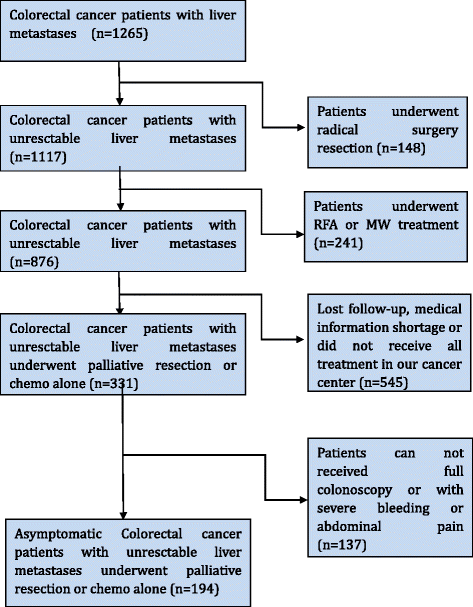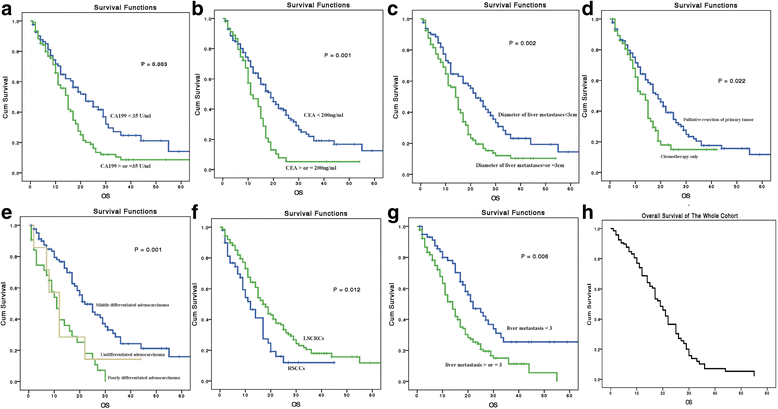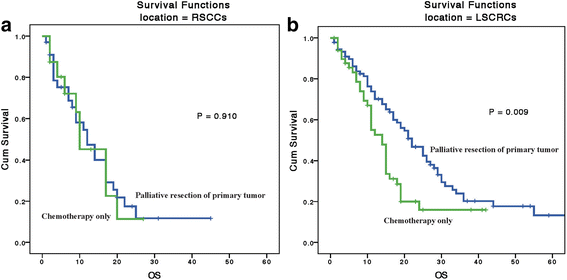Primary tumor location as a predictor of the benefit of palliative resection for colorectal cancer with unresectable metastasis
- PMID: 28750680
- PMCID: PMC5530936
- DOI: 10.1186/s12957-017-1198-0
Primary tumor location as a predictor of the benefit of palliative resection for colorectal cancer with unresectable metastasis
Abstract
Background: It is still under debate that whether stage IV colorectal cancer patients with unresectable metastasis can benefit from primary tumor resection, especially for asymptomatic colorectal cancer patients. Retrospective studies have shown controversial results concerning the benefit from surgery. This retrospective study aims to evaluate whether the site of primary tumor is a predictor of palliative resection in asymptomatic stage IV colorectal cancer patients.
Methods: One hundred ninety-four patients with unresectable metastatic colorectal cancer were selected from Sun Yat-sen University Cancer Center Database in the period between January 2007 and December 2013. All information was carefully reviewed and collected, including the treatment, age, sex, carcinoembryonic antigen, site of tumor, histology, cancer antigen 199, number of liver metastases, and largest diameter of liver metastasis. The univariate and multivariate analyses were used to detect the relationship between primary tumor resection and overall survival of unresectable stage IV colorectal cancer patients.
Results: One hundred twenty-five received palliative resection, and 69 received only chemotherapy. Multivariate analysis indicated that primary tumor site was one of the independent factors (RR 0.569, P = 0.007) that influenced overall survival. For left-side colon cancer patients, primary tumor resection prolonged the median overall survival time for 8 months (palliative resection vs. no palliative resection: 22 vs. 14 months, P = 0.009); however, for right-side colon cancer patients, palliative resection showed no benefit (12 vs. 10 months, P = 0.910).
Conclusions: This study showed that left-side colon cancer patients might benefit from the primary tumor resection in terms of overall survival. This result should be further explored in a prospective study.
Keywords: Colorectal cancer; Primary tumor site; Unresectable liver metastases.
Conflict of interest statement
Consent for publication
Not applicable.
Competing interests
The authors declare that they have no competing interests.
Publisher’s Note
Springer Nature remains neutral with regard to jurisdictional claims in published maps and institutional affiliations.
Figures



Similar articles
-
The role of palliative resection for asymptomatic primary tumor in patients with unresectable stage IV colorectal cancer.Dis Colon Rectum. 2014 Sep;57(9):1049-58. doi: 10.1097/DCR.0000000000000193. Dis Colon Rectum. 2014. PMID: 25101600
-
Palliative primary tumor resection provides survival benefits for the patients with metastatic colorectal cancer and low circulating levels of dehydrogenase and carcinoembryonic antigen.Chin J Cancer. 2016 Jun 29;35(1):58. doi: 10.1186/s40880-016-0120-4. Chin J Cancer. 2016. PMID: 27357402 Free PMC article. Clinical Trial.
-
Surgical Resection of the Primary Tumor in Stage IV Colorectal Cancer Without Metastasectomy is Associated With Improved Overall Survival Compared With Chemotherapy/Radiation Therapy Alone.Dis Colon Rectum. 2016 Apr;59(4):299-305. doi: 10.1097/DCR.0000000000000546. Dis Colon Rectum. 2016. PMID: 26953988 Free PMC article.
-
Resection of the Primary Tumor in Stage IV Colorectal Cancer: When Is It Necessary?Surg Clin North Am. 2017 Jun;97(3):657-669. doi: 10.1016/j.suc.2017.01.012. Surg Clin North Am. 2017. PMID: 28501253 Free PMC article. Review.
-
Primary tumor resection in stage IV unresectable colorectal cancer: what has changed?Med Oncol. 2017 Oct 30;34(12):188. doi: 10.1007/s12032-017-1047-6. Med Oncol. 2017. PMID: 29086041 Free PMC article. Review.
Cited by
-
Recent advances in treatment for colorectal liver metastasis.Ann Gastroenterol Surg. 2018 Apr 17;2(3):167-175. doi: 10.1002/ags3.12071. eCollection 2018 May. Ann Gastroenterol Surg. 2018. PMID: 29863162 Free PMC article. Review.
-
Primary tumor resection improves prognosis of unresectable carcinomas of the transverse colon including flexures with liver metastasis: a preliminary population-based analysis.BMC Cancer. 2021 May 6;21(1):503. doi: 10.1186/s12885-021-08157-0. BMC Cancer. 2021. PMID: 33957871 Free PMC article.
-
Survival benefit of primary and metastatic tumor resection for colon cancer with liver metastases: A population based, propensity score-matched study.Front Surg. 2022 Aug 30;9:959826. doi: 10.3389/fsurg.2022.959826. eCollection 2022. Front Surg. 2022. PMID: 36111222 Free PMC article.
-
The Role of Primary Tumor Resection in Colorectal Cancer Patients with Asymptomatic, Synchronous, Unresectable Metastasis: A Multicenter Randomized Controlled Trial.Cancers (Basel). 2020 Aug 16;12(8):2306. doi: 10.3390/cancers12082306. Cancers (Basel). 2020. PMID: 32824392 Free PMC article.
-
Impact of primary tumour location on colorectal liver metastases: A systematic review.World J Clin Oncol. 2020 May 24;11(5):294-307. doi: 10.5306/wjco.v11.i5.294. World J Clin Oncol. 2020. PMID: 32728532 Free PMC article.
References
-
- Chen W, Zheng R, Baade PD, Zhang S, Zeng H, Bray F, Jemal A, Yu XQ, He J. Cancer statistics in China, 2015. CA Cancer J Clin. 2016;66:115–32. - PubMed
Publication types
MeSH terms
Substances
LinkOut - more resources
Full Text Sources
Other Literature Sources
Medical

